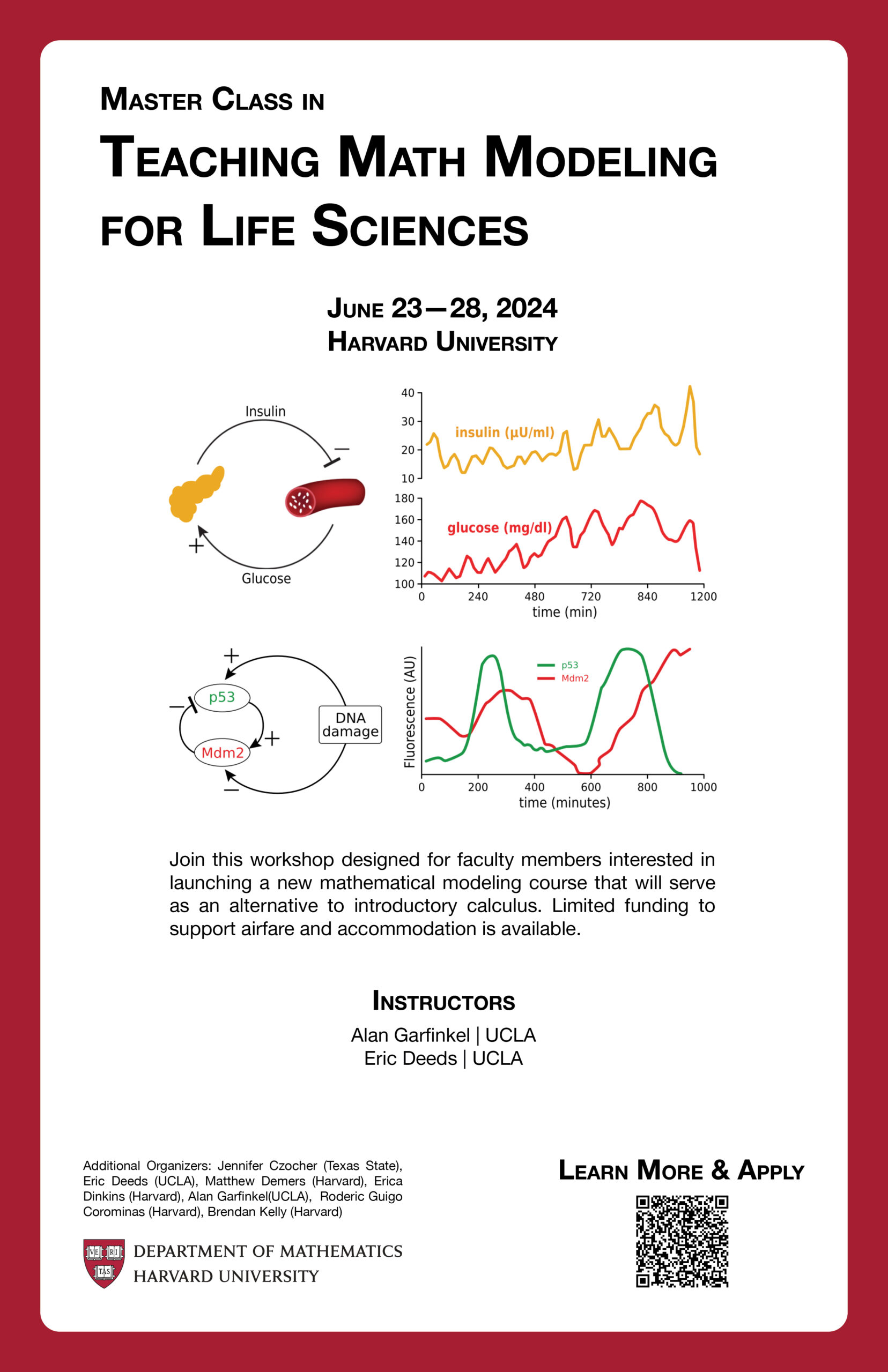
2024 Master Class in Teaching Math Modeling for Life Sciences
ANNOUNCEMENTS, OTHER MATHEMATICS DEPARTMENT EVENTS
Where: Harvard University, Cambridge, MA
When: June 23 – June 28, 2024
Application Form
To apply please follow the link above and fill out the form, where you will be asked to submit the following:
1. Your Curriculum Vitae.
2. A statement of purpose identifying the logic for a new course at the applicant’s institution, a specific plan of how the new course will impact underrepresented students, your institution’s support for the endeavour, and a timeline for course development.
3. A letter of support from a department chair or dean recognizing the need for change in the introductory calculus sequence.
*Limited funding is available if your institution does not offer financial support or sponsorship.
Space and funding are limited.
There is a growing realization that traditional “Calculus for Life Sciences” courses do not show their applicability to the Life Sciences and discourage student interest. There have been calls from the AAAS, the Howard Hughes Medical Institute, the NSF, and the American Association of Medical Colleges for a new kind of math course for biology students, that would focus on dynamics and modeling, to understand positive and negative feedback relations, in the context of important biological applications, not incidental “examples.”
The workshop is designed for faculty members who are interested in launching a new mathematical modeling course that will serve as an alternative to introductory calculus by the end of the 2025 – 2026 academic year.
Introductory mathematics courses can equip students with the knowledge, skills, and dispositions necessary to solve the important problems our world faces. Despite this incredible potential to create transformative educational experiences, students often encounter introductory mathematics courses as a burdensome requirement. Educational research has shown that across age levels, content, and nations, that centering modeling in introductory mathematics courses supports students in their civic engagement and persistence in STEM. This summer we are offering a master class for faculty interested in offering a modeling focused course for life science students.
During the master class, you will:
• Become familiar with the content and pedagogical approach of UCLA’s successful course LS 30, by working through the syllabus of LS 30 with attention to the mathematical and scientific content and inclusive teaching techniques that will unlock success for the course you are designing.
• Learn how to bring modern computational tools into your classroom via Jupyter notebooks and Google Colab and think about the pedagogical challenges in teaching Python in the classroom.
• Be able to frame the underlying mathematical ideas in ways that are meaningful to students who have not completed a long list of prerequisite courses including calculus.
• Learn about modern approaches to mathematical modeling being employed in cutting-edge biology research that is accessible to students without a calculus prerequisite.
• Frame the goals and benefits of a modeling-focused introductory mathematics class for different stakeholders to unlock change at your institution.
• Develop a syllabus for a new modeling course for life science students that leverages existing material, fits your institution’s context, and empowers your students to approach modern scientific problems.
Organizers
- Jennifer Czocher, Texas State, Mathematics
- Eric Deeds, UCLA Integrative Biology & Physiology
- Matthew Demers, Harvard University Department of Mathematics
- Erica Dinkins, Harvard University Department of Mathematics
- Alan Garfinkel, UCLA, Professor of Medicine and Designer of LS 30
- Roderic Guigo Corominas, Harvard University Department of Mathematics
- Brendan Kelly, Harvard University Department of Mathematics
